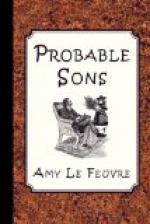“I remember you,” she said; “you were one of the gentlemen that laughed at me.”
“I don’t think I could have been guilty of such rudeness, surely.”
“Now, I think you may run away,” Sir Edward said, “and tell nurse I will ring when I want her.”
Milly obeyed, and confided to nurse that she hoped the “new gentleman” would not keep her away from her uncle. “For do you know, nurse, I like Uncle Edward so much better when he is in bed. He looks so sad, and speaks so softly. I wish I could sit with him every day.”
Major Lovell was a distant cousin of Sir Edward, and there existed a warm friendship between them. The very brightness of his tone seemed to do the invalid good, and Milly was quite delighted to find that her uncle’s visitor not only listened with interest to the account of her favorite games and pastimes, but insisted upon joining her in them, and the walls of the quiet old house rang again with merry mirth and laughter such as they had not known for years.
Upstairs in the sick room Major Lovell proved a wonderfully patient and skillful nurse; but there were times when all his bright cheeriness could not smooth the furrows in the invalid’s brow, or take away the fretfulness of tone.
One morning Major Lovell came down from an interview with him with a puzzled expression of face. Catching sight of Milly in the hall, equipped in hat and jacket, he asked,—
“Are you going out with nurse?”
“No, nurse is busy—just by my own self, in the avenue with Fritz. Do come with me.”
The major consented, but with a graver face than usual, and then suddenly, very full of his own thoughts, said to the child,—
“I believe your uncle has something on his mind. It strikes me from different things he has let drop that he is turning pious.”
“What is pious?” inquired Milly, instantly.
“What is it? A pious person thinks every one wicked but themselves, and condemns everybody and everything all round them. They are most objectionable people, little woman, so mind you never take up that line, and the worst of it is that they’re so satisfied with their own goodness, that you can’t crush them, try as much as you may.”
“And is Uncle Edward going to be like them?” asked the child, with a perplexed face.
“I devoutly hope not. I shall do all in my power to prevent it.”
“What do pious people do?” questioned Milly.
“Do! They give tracts away and sing hymns, and pull long faces over very well-bound Bibles.”
“I like singing hymns,” asserted Milly, very emphatically; “everybody sings hymns to God, don’t they? I listen to the birds, sometimes, and wish I could sing like them; and the trees sing, and the bees and flies. Everything seems to sing out of doors in the summer time, but they’ve nearly all dropped asleep now till next year. What hymns do you sing, Major Lovell?”




